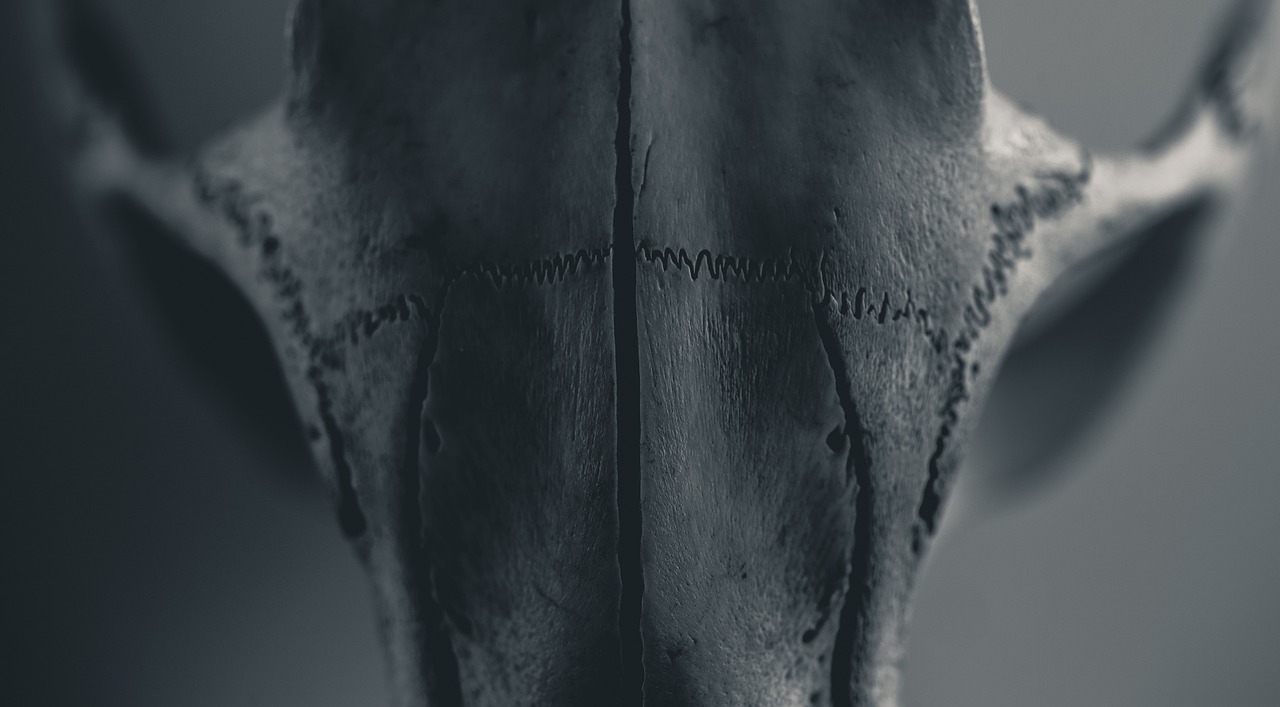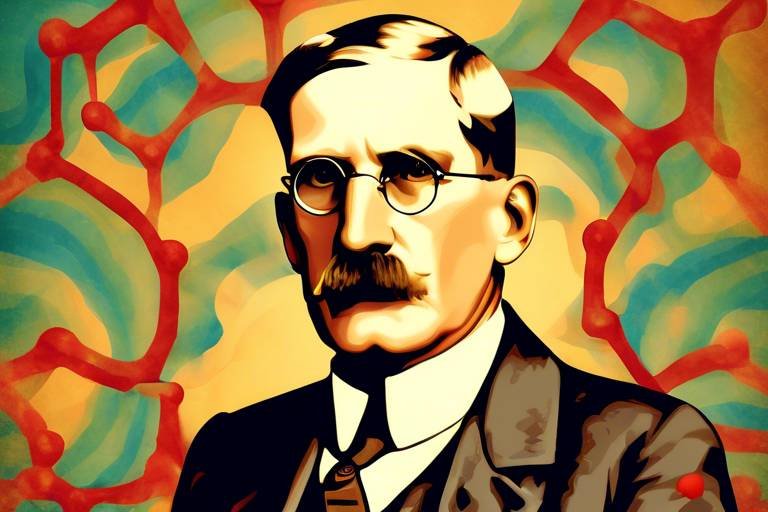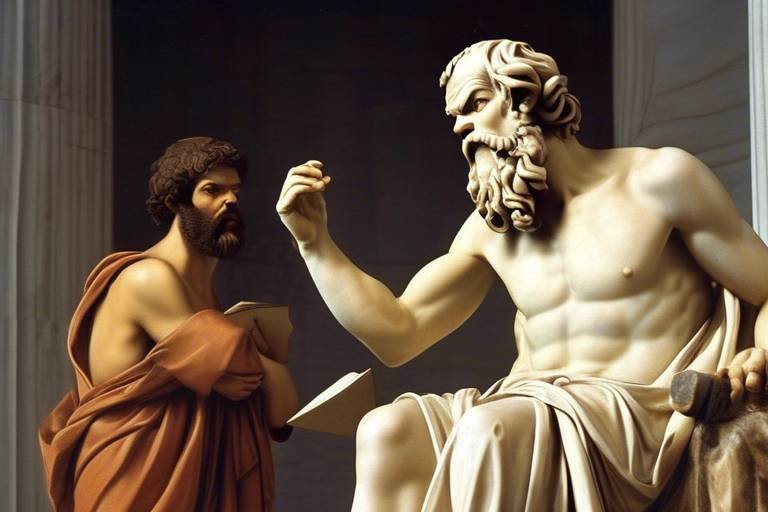Is Death to be Feared or Embraced?
Death is one of those universal experiences that everyone will face, yet it remains one of the most mysterious and controversial topics in human existence. It's like that dark cloud looming over us, often evoking feelings of fear, anxiety, and uncertainty. But what if we flipped the script? What if, instead of dreading death, we embraced it as a natural part of life? This article aims to explore the complex emotions surrounding death, examining various philosophical, cultural, and psychological perspectives to help us understand whether death should be feared or embraced.
At its core, death is an inevitable conclusion to our life’s journey. While many of us might instinctively recoil at the thought, understanding the nature of death can significantly alleviate our fears. Think about it: death is not just an endpoint; it’s a transition, a transformation, much like the changing of the seasons. Just as winter makes way for spring, death can be seen as a necessary step in the cycle of life. The biological perspective offers a clear view of death as a natural phenomenon, a process that all living organisms undergo. But delve deeper, and you’ll find that death also holds profound philosophical and existential meanings, challenging us to confront our own mortality and the legacy we leave behind.
In many cultures, death is celebrated rather than feared. For instance, the Mexican Day of the Dead is a vibrant festival where families honor their deceased loved ones with colorful altars, food, and festivities. This cultural perspective highlights that death is not merely an end but a continuation of relationships in a different form. When we understand how various societies perceive death, we can see how these beliefs shape their mourning practices and attitudes toward life itself. It’s fascinating to observe how different cultures approach this universal phenomenon, often with a sense of reverence and respect.
From a religious standpoint, many belief systems offer specific teachings about death and the afterlife. For example, in Western religions like Christianity and Judaism, death is often portrayed as a transition to an afterlife, a gateway to eternal life for the righteous. This perspective can provide comfort, encouraging followers to live morally and purposefully. On the other hand, Eastern religions such as Buddhism and Hinduism view death as part of a cyclical existence, where the soul is reborn in a new form. This belief fosters acceptance of death, encouraging individuals to see it as an opportunity for spiritual evolution rather than an end.
Philosophically, the meaning of death has been debated for centuries. Thinkers like Socrates, Epicurus, and Heidegger have delved into the implications of mortality, urging us to live authentically and meaningfully. They suggest that by acknowledging our mortality, we can lead richer lives, focusing on what truly matters. After all, if we know that our time is limited, we might prioritize our relationships, passions, and experiences over trivial concerns. This perspective can transform our fear of death into a celebration of life, prompting us to embrace every moment.
However, it’s essential to recognize that many people experience anxiety related to death. This anxiety can manifest in various ways, impacting mental health and overall well-being. Understanding the roots of death anxiety is crucial for addressing it. Often, it stems from fear of the unknown, loss of control, or the grief associated with losing loved ones. By exploring therapeutic approaches, such as mindfulness and acceptance, individuals can learn to cope with these fears and embrace life more fully, acknowledging that death is just one part of the human experience.
In conclusion, the question of whether death should be feared or embraced is complex and deeply personal. While fear is a natural response, understanding the nature of death through various lenses—biological, cultural, philosophical, and psychological—can help us shift our perspective. Embracing death as a natural part of life can lead to a more fulfilling existence, encouraging us to cherish our time and the connections we make along the way. So, the next time you find yourself pondering the inevitability of death, consider this: what if, instead of fearing it, you embraced it as a catalyst for living more fully?
- Why do we fear death? Fear of death often stems from the unknown and the uncertainty of what happens after we die.
- How can understanding death help alleviate fear? By exploring the nature of death and different cultural and philosophical perspectives, we can reframe our understanding and reduce anxiety.
- What role do cultural beliefs play in how we perceive death? Cultural beliefs shape our rituals and attitudes toward death, influencing how we mourn and remember those who have passed.
- Can philosophical perspectives help us cope with death? Yes, philosophical discussions about mortality can encourage us to live authentically and prioritize what truly matters in our lives.
- What are some coping mechanisms for death anxiety? Strategies such as mindfulness, acceptance, and open conversations about death can help individuals manage their fears.

The Nature of Death
Understanding what death truly means can help alleviate fears that often accompany it. Death isn't just a biological end; it's a complex phenomenon that intertwines with our philosophical and existential interpretations of life. Biologically, death signifies the cessation of all vital functions that sustain a living organism. But if we look deeper, we realize that death can be seen as a transition rather than an end. Just as a caterpillar transforms into a butterfly, one could argue that death is merely a metamorphosis into another state of existence.
Philosophically, death raises profound questions about our purpose and the meaning of life. Think about it: if life is a fleeting moment, what does that say about how we choose to live? Existentialists like Jean-Paul Sartre and Martin Heidegger have explored these themes, suggesting that the awareness of our mortality can actually enhance our appreciation for life. It’s as if the knowledge of a ticking clock encourages us to make the most of every second.
From a psychological standpoint, the fear of death often stems from the unknown. This fear can be paralyzing, leading to what is known as death anxiety. Many people grapple with questions like:
- What happens after we die?
- Is there an afterlife, or is it just darkness?
- Will I be remembered, or will I fade into oblivion?
These questions can create a whirlwind of emotions, making it essential to explore death not just as an end, but as a significant part of the human experience. Understanding the nature of death can empower us to live more fully, to embrace our relationships, and to cherish the moments we often take for granted.
In summary, the nature of death is multifaceted. It encompasses biological, philosophical, and psychological dimensions that influence how we perceive our mortality. By reframing our understanding of death, we can shift from a mindset of fear to one of acceptance, allowing us to embrace life in all its complexities.

Cultural Perspectives on Death
Death is a universal phenomenon, yet its interpretation varies dramatically across different cultures. The way societies perceive death shapes their rituals, mourning practices, and even how they celebrate life. For many, death is not just an end; it can be a transition, a journey, or a transformation. Understanding these cultural perspectives can help us appreciate the rich tapestry of beliefs surrounding mortality.
In many cultures, death is treated with a sense of reverence and respect. For instance, in Mexican culture, the Día de los Muertos (Day of the Dead) is a vibrant celebration honoring deceased loved ones. Families create altars, or ofrendas, adorned with photos, favorite foods, and mementos, believing that the spirits of the dead return to join the festivities. This perspective embraces death as a continuation of life, fostering a connection between the living and the dead.
Conversely, in some Western cultures, death is often cloaked in somber rituals and a sense of finality. Funerals can be quite formal, emphasizing grief and loss rather than celebration. This cultural approach may stem from a belief that death is an absolute end, leading to a fear of the unknown. However, even within these cultures, there are emerging trends that challenge traditional views, such as celebration-of-life ceremonies that focus on honoring the deceased's legacy rather than mourning their absence.
Interestingly, the way death is perceived can also influence mental health. Research suggests that cultures that view death as a part of the life cycle tend to have lower levels of death anxiety. This can be attributed to a more integrated approach to life and death, where the two are seen as interconnected. On the other hand, cultures that emphasize the finality of death may foster feelings of dread and anxiety surrounding mortality.
To illustrate these cultural differences, consider the following table that summarizes various cultural attitudes towards death:
| Culture | Perception of Death | Common Practices |
|---|---|---|
| Mexican | Celebratory, cyclical | Día de los Muertos, altars |
| Western (e.g., U.S.) | Final, somber | Funerals, memorial services |
| Hindu | Cyclical, spiritual evolution | Cremation, mourning rituals |
| Buddhist | Impermanent, part of life | Rituals for the deceased, meditation |
Ultimately, cultural perspectives on death are deeply rooted in historical, spiritual, and social contexts. They serve not only to guide individuals through the grieving process but also to shape societal norms and values. By exploring these diverse views, we can foster a greater understanding of our own beliefs and perhaps find comfort in the shared human experience of mortality.
As we navigate our own feelings about death, it’s essential to consider how cultural influences shape our perceptions. Embracing a broader understanding of death can lead to a more profound appreciation of life itself.
- Why do different cultures have varying beliefs about death?
Different historical, spiritual, and social contexts influence how cultures perceive and respond to death. - How can understanding cultural perspectives on death help me cope with my fears?
Learning about various beliefs can provide comfort and insight, helping you find meaning in your own experiences with mortality. - What are some common rituals associated with death in different cultures?
Rituals vary widely; for instance, the Mexican Día de los Muertos celebrates deceased loved ones, while Western funerals often emphasize mourning and loss.

Religious Views on Death
When it comes to understanding death, religion plays a pivotal role in shaping our perceptions, beliefs, and even our emotions surrounding this inevitable part of life. Many religions offer specific teachings about what happens after we take our last breath, creating a framework that can either comfort or instill fear in their followers. For instance, in Western religions, death is often viewed as a transition to an afterlife, a concept that provides hope and purpose. Conversely, Eastern religions tend to embrace the idea of death as a natural cycle, encouraging acceptance and spiritual growth.
Let's take a closer look at how these religious perspectives differ:
| Religion | View on Death | Afterlife Belief |
|---|---|---|
| Christianity | Death is a passage to eternal life. | Heaven and Hell |
| Judaism | Death is part of God's plan, leading to a future resurrection. | World to Come |
| Buddhism | Death is part of the cycle of rebirth. | Reincarnation |
| Hinduism | Death is a transition to another life based on karma. | Moksha (liberation) |
In Christianity, death is often viewed as a gateway to eternal life. Believers are taught that through faith in Jesus Christ, they can attain salvation and a place in Heaven. This promise can provide immense comfort to those facing the end of life, as they believe in the hope of reunion with loved ones and eternal peace. On the other hand, the fear of Hell can also create anxiety, as followers grapple with the moral implications of their actions during their earthly existence.
Judaism presents a nuanced view of death. While it acknowledges the sorrow of losing a loved one, it emphasizes the importance of life and the legacy one leaves behind. The belief in the World to Come offers a sense of continuity, as many Jews hold that the soul lives on and will eventually be resurrected. This perspective encourages adherents to lead a righteous life, contributing positively to the world around them.
In Eastern religions, such as Buddhism and Hinduism, death is often seen as a natural progression rather than an end. Buddhism teaches that death leads to rebirth, and the cycle of life and death continues until one achieves enlightenment. This belief fosters a sense of acceptance and encourages individuals to live mindfully, focusing on the present rather than fearing the unknown. Hinduism, similarly, views death as a transition influenced by one’s karma, with the ultimate goal being Moksha, or liberation from the cycle of rebirth.
These diverse religious perspectives on death can profoundly impact how individuals cope with loss and their own mortality. Whether it’s the hope of an afterlife, the promise of rebirth, or the moral imperative to live a good life, these beliefs provide frameworks that help many navigate their feelings about death. But the question remains: do these teachings ultimately lead us to embrace death as a natural part of life, or do they instill a fear of the unknown? The answer likely lies in the individual’s interpretation and personal experiences.
- What is the significance of death in religion?
Death is often seen as a transition to another state of existence, influencing how individuals live their lives and cope with loss.
- How do different religions view the afterlife?
Beliefs vary widely: some religions promise eternal peace, while others focus on cycles of rebirth or moral consequences.
- Can religious beliefs help alleviate fear of death?
Yes, many individuals find comfort in their faith, which can provide hope and a sense of purpose in facing mortality.

Western Religions
When we dive into the realm of , we encounter a fascinating tapestry of beliefs and traditions that shape how millions perceive death and the afterlife. Predominantly, these religions—especially Christianity and Judaism—view death not as an end but as a significant transition. This perspective can be both comforting and daunting, depending on one's beliefs and actions throughout life.
In Christianity, for instance, death is often seen as a gateway to eternal life. The promise of an afterlife where souls are rewarded or punished based on their earthly lives provides a profound motivation for adherents to live morally. This belief encourages followers to engage in good deeds, seek forgiveness, and cultivate a relationship with God, all in anticipation of a heavenly existence. However, the fear of judgment can also lead to anxiety, as many grapple with questions like, "Have I done enough?" or "What if I fail to be saved?"
Judaism, on the other hand, offers a more varied interpretation of the afterlife. While some Jewish teachings emphasize the resurrection of the dead and a world to come, others focus more on the importance of living a righteous life in the present. This duality can lead to a rich dialogue within the community about the nature of death. Here, the emphasis is often placed on moral living and community support during times of mourning, which helps individuals navigate their grief while reinforcing the value of life itself.
Interestingly, both religions share a common thread: the notion that life should be lived with purpose and intention. In fact, many Western religious traditions encourage rituals and practices that honor the deceased, allowing the living to celebrate life even in the face of loss. For example, memorial services, prayer, and the lighting of candles are common practices that help individuals remember and cherish their loved ones. These rituals serve not only to honor the departed but also to provide a sense of closure and community support for those left behind.
Ultimately, the teachings of Western religions regarding death can provide both comfort and challenge. They invite believers to reflect on their lives, their relationships with others, and their understanding of the divine. As we ponder the mysteries of mortality, these faith traditions encourage us to embrace life fully, live ethically, and seek connection with something greater than ourselves.
In conclusion, the perspectives offered by Western religions on death are complex and multifaceted. They can instill a sense of hope and purpose, urging individuals to live with intention while also grappling with the inevitable reality of mortality. This duality is what makes the conversation around death in these traditions so rich and compelling.

Eastern Religions
When we dive into the rich tapestry of , we uncover a profound understanding of death that is often starkly different from Western perspectives. In traditions such as Buddhism and Hinduism, death is not viewed as an end but rather as a vital part of a larger cycle of existence. This cyclical view is encapsulated in the concepts of reincarnation and karma, where the soul is believed to undergo numerous births and deaths, evolving through each cycle.
For instance, in Buddhism, death is seen as a transition rather than a termination. It is a moment where the consciousness separates from the physical body, leading to rebirth in a new form. This belief encourages practitioners to live a life of mindfulness and compassion, as every action contributes to their karmic footprint, influencing future lives. The idea of samsara, the cycle of birth, death, and rebirth, is central to Buddhist thought, prompting individuals to seek enlightenment and liberation from this cycle.
On the other hand, Hinduism also embraces the cycle of life and death, emphasizing the importance of fulfilling one's dharma or duty in life. Hindus believe that the soul (or atman) is eternal and that physical death is merely a transition to another existence. This belief system fosters a sense of acceptance towards death, as it is viewed as a natural progression rather than a finality. The rituals surrounding death, such as cremation, are steeped in tradition, symbolizing the release of the soul from the physical body and its journey towards liberation (moksha).
These beliefs shape how individuals in Eastern cultures approach death, often with a sense of peace rather than fear. The emphasis on acceptance and the understanding that death is part of a larger cosmic order can offer comfort to those grappling with the concept of mortality. Furthermore, the rituals and practices associated with death in these religions serve as a way to honor the deceased, providing a communal space for reflection and remembrance.
In summary, Eastern religions offer a unique lens through which to view death, encouraging adherents to embrace it as an integral part of life’s journey. By fostering a mindset that values spiritual evolution and interconnectedness, these traditions help alleviate the fear surrounding death, transforming it into a profound experience of continuity and growth.
- What is the primary belief about death in Buddhism?
Buddhism views death as a transition to another form of existence, emphasizing the importance of mindfulness and compassion in life. - How do Hindus perceive death?
In Hinduism, death is seen as a natural progression in the cycle of life, with the soul continuing its journey towards liberation. - What role does karma play in Eastern religions?
Karma influences the soul's journey through reincarnation, where actions in one life affect future existences. - Are there specific rituals for death in Eastern religions?
Yes, both Buddhism and Hinduism have specific rituals that honor the deceased and facilitate their journey in the afterlife.

Philosophical Approaches to Death
When we ponder the concept of death, we often find ourselves tangled in a web of complex emotions and thoughts. Philosophers have long grappled with the implications of mortality, offering various interpretations that can help us navigate our own feelings about this inevitable part of life. One might wonder, why should we even bother contemplating death? Well, engaging with these philosophical perspectives can provide us with a deeper understanding of our existence and, paradoxically, can help us live more fully.
One prominent philosopher, Martin Heidegger, argued that an authentic life is only possible when we acknowledge our own mortality. He believed that by confronting the reality of death, we can free ourselves from the trivialities of everyday life and focus on what truly matters. In his view, awareness of death can lead to a more meaningful existence, prompting us to cherish our relationships and experiences. Isn't it fascinating to think that the very thing we fear could actually enhance our appreciation for life?
Another influential thinker, Epicurus, took a different stance. He posited that death should not be feared because, once we die, we no longer experience anything—neither pleasure nor pain. According to Epicurus, the fear of death is irrational; it is simply the end of sensation. He famously stated, "Death is nothing to us; when we exist, death is not, and when death exists, we do not." This perspective encourages us to focus on living well in the present rather than worrying about what lies beyond. Epicurus invites us to embrace life, not to be paralyzed by the fear of its conclusion.
In contrast, existentialist philosophers like Jean-Paul Sartre and Simone de Beauvoir emphasize the importance of individual choice and responsibility in the face of death. They argue that acknowledging our mortality can empower us to create our own meaning in life. For them, the awareness of death serves as a catalyst for personal growth and self-discovery. By confronting the absurdity of existence, we are prompted to make conscious choices that reflect our true selves. This perspective can be liberating; it suggests that we are not merely victims of fate but active participants in crafting our destinies.
Moreover, the philosophy of Stoicism offers practical wisdom on how to approach death. Stoics advocate for the acceptance of death as a natural part of life, encouraging individuals to focus on what they can control—namely, their thoughts and actions. They teach that by practicing mindfulness and reflection, we can cultivate a sense of tranquility in the face of mortality. The Stoic mantra, "Memento Mori," which translates to "remember you must die," serves as a reminder to live with intention and purpose. Rather than fearing death, Stoics suggest that we should embrace it as a motivator to live virtuously.
In summary, philosophical approaches to death provide us with diverse lenses through which to examine our mortality. Whether we find solace in the existential freedom of creating our own meaning, the rational acceptance of death's inevitability, or the Stoic practice of mindfulness, each perspective offers valuable insights. Engaging with these ideas not only helps us confront our fears but also enriches our understanding of what it means to live fully. After all, isn't it the knowledge of our finite time that makes life so precious?
- Why is it important to think about death?
Contemplating death can enhance our appreciation for life, encouraging us to focus on what truly matters and live authentically. - How can philosophical perspectives help with death anxiety?
Philosophical approaches can provide comforting frameworks, helping individuals find meaning and acceptance in the face of mortality. - What role does culture play in our understanding of death?
Cultural beliefs shape our attitudes toward death and influence our mourning practices, impacting how we cope with loss.

The Psychology of Death Anxiety
Many people experience a profound sense of anxiety when it comes to the subject of death. This anxiety, often referred to as death anxiety, can be a heavy burden that affects mental health and overall well-being. But what exactly is death anxiety, and why does it manifest in such diverse ways? Understanding this psychological phenomenon is crucial for anyone grappling with their own mortality or the loss of loved ones.
At its core, death anxiety is rooted in the fear of the unknown. When we think about death, we are confronted with questions that have no definitive answers: What happens after we die? Is there an afterlife? Will I be remembered? These questions can trigger feelings of helplessness and dread, leading to a cycle of anxiety that can be difficult to break. It's not just the fear of dying itself, but also the fear of the process of dying and what it may entail.
Death anxiety can manifest in various ways, affecting individuals differently. Some may experience physical symptoms, such as increased heart rate or sweating, while others might find themselves preoccupied with thoughts of mortality. Here are some common manifestations of death anxiety:
- Existential dread: A pervasive feeling of unease about the meaning of life and the inevitability of death.
- Obsessive thoughts: Constantly thinking about death or engaging in behaviors that reflect a fear of dying.
- Avoidance behaviors: Steering clear of conversations about death or avoiding situations that remind one of mortality.
But what causes death anxiety? Several psychological factors contribute to this complex emotional response. For instance, traumatic experiences related to loss can trigger heightened anxiety about one's own mortality. Additionally, cultural and societal norms play a significant role. In cultures that taboo discussions about death, individuals may find themselves grappling with fears in isolation, intensifying their anxiety.
It's essential to recognize that experiencing death anxiety is a common human experience. The key is how we choose to cope with these feelings. Understanding the psychology behind death anxiety not only helps us to confront our fears but also opens the door to healing and acceptance. Therapeutic approaches, such as cognitive-behavioral therapy (CBT) and mindfulness practices, can be incredibly effective in managing these anxieties. They encourage individuals to face their fears head-on, fostering a sense of empowerment and resilience.
Moreover, embracing conversations about death can be liberating. By discussing our fears and thoughts openly, we can demystify death and transform our relationship with it. This can lead to a deeper appreciation of life and help us live more fully in the present moment. Ultimately, the goal is to shift our perspective from viewing death solely as something to be feared, to recognizing it as a natural part of the human experience.
| Question | Answer |
|---|---|
| What is death anxiety? | Death anxiety is the fear and apprehension surrounding the concept of death and dying, often leading to emotional distress. |
| How can I cope with death anxiety? | Practices such as mindfulness, cognitive-behavioral therapy, and open discussions about death can help manage these fears. |
| Is death anxiety common? | Yes, many people experience some degree of death anxiety at different points in their lives. |

Understanding Death Anxiety
Death anxiety is a pervasive yet often unspoken fear that many individuals grapple with throughout their lives. It can be likened to an unwelcome guest that shows up uninvited, lurking in the corners of our minds, causing discomfort and unease. This anxiety can manifest in various ways, ranging from a nagging worry about the future to debilitating panic attacks. Understanding the roots of this fear is essential for anyone looking to navigate their feelings about mortality.
At its core, death anxiety stems from the uncertainty surrounding what happens after we die. This existential dread is not just about the act of dying itself but also encompasses the fear of the unknown. People often find themselves pondering questions such as, “What if there’s nothing after this life?” or “Will I be remembered?” These questions can trigger a range of emotions, from sadness to anger, and can lead to a profound sense of existential crisis.
Moreover, societal attitudes towards death play a significant role in shaping our perceptions. In many cultures, death is a taboo subject, rarely discussed openly. This silence can exacerbate feelings of isolation for those who are struggling with death anxiety. It’s as if we are all part of a grand play, yet the script has been written without any mention of the final act. Consequently, individuals may feel as though they are navigating their fears alone, without support or guidance.
To better understand death anxiety, it’s helpful to recognize its symptoms. These can include:
- Persistent worrying about death or dying
- Physical symptoms like increased heart rate or sweating
- Difficulty concentrating on daily tasks
- Feelings of dread or panic when thinking about mortality
These symptoms can significantly impact an individual’s quality of life, leading to avoidance behaviors or even depression. It’s essential to acknowledge that these feelings are valid and that many people experience them at some point in their lives. Recognizing death anxiety is the first step toward addressing it.
In conclusion, understanding death anxiety involves a multifaceted approach that considers personal beliefs, cultural influences, and psychological factors. By shining a light on this often-ignored topic, we can begin to foster a healthier dialogue around death, making it less of a taboo and more of a natural part of the human experience. Embracing this understanding can not only alleviate fear but also empower individuals to live more fully in the present, appreciating the beauty of life while acknowledging its inevitable conclusion.

Coping Mechanisms
Coping with the anxiety surrounding death is an essential journey for many individuals, as it allows them to embrace life more fully while acknowledging the inevitable end we all face. One of the most effective ways to manage these fears is through the practice of mindfulness. This approach encourages individuals to stay present in the moment, reducing the tendency to dwell on fears of the future or ruminate on past losses. By focusing on the here and now, people can cultivate a sense of peace and acceptance, allowing them to navigate their feelings about mortality with greater clarity.
Another powerful mechanism is the development of an acceptance mindset. This involves recognizing that death is a natural part of life, much like the changing seasons. Just as winter gives way to spring, our lives are marked by cycles of beginnings and endings. Embracing this perspective can transform death from a source of fear into a profound reminder of the beauty and fragility of life. It encourages individuals to live more authentically, prioritizing what truly matters to them.
Engaging in open conversations about death can also be incredibly liberating. Many people shy away from discussing mortality, but sharing thoughts and feelings with trusted friends or family members can alleviate some of the weight of anxiety. These discussions can lead to deeper connections and a shared understanding of the human experience, fostering a supportive environment where fears can be expressed and explored.
Additionally, participating in rituals and memorial activities can provide a sense of closure and connection. Whether it’s attending a memorial service, creating a scrapbook of memories, or lighting a candle in remembrance, these acts can help individuals honor their feelings and the lives of those they have lost. Rituals serve as a bridge between the past and the present, allowing individuals to process their grief and celebrate the lives of loved ones.
Lastly, seeking professional help can be a crucial step in managing death anxiety. Therapists trained in grief counseling or existential therapy can provide valuable tools and insights to help individuals cope with their fears. Cognitive-behavioral therapy (CBT), for instance, can assist individuals in reframing their thoughts about death, turning irrational fears into manageable concerns. By addressing these feelings with a professional, individuals can learn to navigate their anxiety more effectively and find a path toward acceptance.
In summary, coping with death anxiety is not about eliminating fear but rather about transforming it into a catalyst for personal growth. Through mindfulness, acceptance, open communication, engaging in rituals, and seeking professional support, individuals can learn to embrace life in all its complexity, appreciating each moment while acknowledging the inevitability of death.
- What is death anxiety? Death anxiety refers to the fear or apprehension individuals feel about their own mortality or the death of loved ones.
- How can mindfulness help with death anxiety? Mindfulness encourages individuals to focus on the present moment, reducing worry about the future and promoting acceptance.
- Are there specific rituals that can help cope with death? Yes, engaging in memorial activities, such as creating memory books or attending services, can provide comfort and closure.
- When should I seek professional help for death anxiety? If your anxiety is overwhelming or interfering with your daily life, it may be beneficial to consult a therapist.
Frequently Asked Questions
- What is the nature of death?
Death can be understood from various perspectives, including biological, philosophical, and existential views. Biologically, it marks the end of life functions, while philosophically, it raises questions about existence and what it means to live. Understanding these aspects can help alleviate fears surrounding death.
- How do different cultures perceive death?
Cultural perspectives on death vary widely. Some cultures celebrate death as a transition, while others may view it with fear or sadness. These beliefs shape mourning practices and rituals, influencing how individuals cope with loss and remember their loved ones.
- What role do religions play in shaping views on death?
Religions often provide teachings about death and the afterlife that can either comfort or instill fear in their followers. For example, Western religions like Christianity and Judaism may present death as a gateway to an afterlife, while Eastern religions like Buddhism and Hinduism often view it as part of a cyclical journey of rebirth.
- What is death anxiety?
Death anxiety refers to the fear or apprehension about death and dying. It can manifest in various ways, affecting mental health and overall well-being. Understanding the causes and symptoms of death anxiety can help individuals address these feelings more effectively.
- How can one cope with death anxiety?
Developing healthy coping mechanisms is essential for managing death anxiety. Techniques such as mindfulness, acceptance, and open discussions about death can empower individuals to embrace life while acknowledging their fears regarding mortality.
- Is it normal to fear death?
Yes, fearing death is a common human experience. Many people grapple with the unknown aspects of death, which can lead to anxiety. Recognizing this fear as a natural part of life can help individuals explore their feelings and find ways to cope.



















